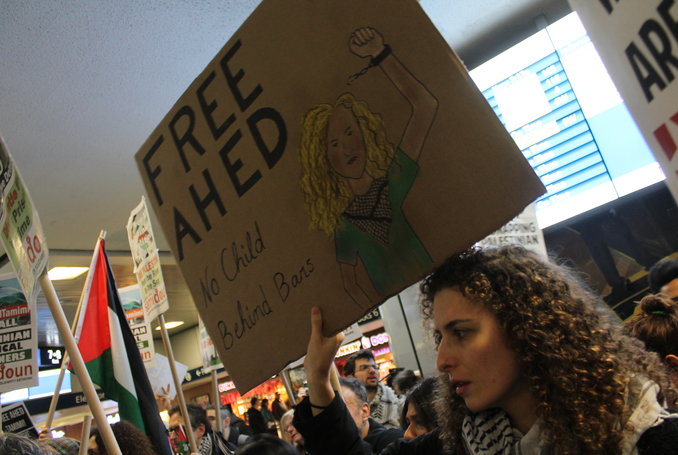
Reporting in The Intercept, journalist Glenn Greenwald wrote about a recent US court decision that labels efforts aimed at punishing those who boycott Israel as ‘unconstitutional.’
The decision is considered a major victory for the Boycott, Divestment and Sanctions (BDS) movement and its supporters, who have been targeted by a series of US state laws.
When you see women, children, & journalists attacked publicly and boldly … then you arrived at the #ApartheidIsrael. #BDS #IsraelNaked pic.twitter.com/GVrv4EV2Qj
— Dr. Basem Naim (@basemn63) February 2, 2018
These are excerpts from Gleenwald’s piece:
“A federal judge on Tuesday (Jan 30) ruled that a Kansas law designed to punish people who boycott Israel is an unconstitutional denial of free speech. The ruling is a significant victory for free speech rights because the global campaign to criminalize, or otherwise legally outlaw, the Boycott, Divestment, and Sanctions movement has been spreading rapidly in numerous political and academic centers in the U.S. This judicial decision definitively declares those efforts — when they manifest in the U.S. — to be a direct infringement of basic First Amendment rights guaranteed by the U.S. Constitution.
Some #Israelis want to apply their draconian anti-#BDS law to penalize #NewZealand activists who asked #Lorde to cancel her TelAviv show. Israel not only violates #Palestinian rights, it wants to extend its long arm of oppression to deny free speech to NZ https://t.co/mAcgijnw7U
— James J. Zogby (@jjz1600) February 1, 2018
“The enjoined law, enacted last year by the Kansas legislature, requires all state contractors — as a prerequisite to receiving any paid work from the state — “to certify that they are not engaged in a boycott of Israel.” The month before the law was implemented, Esther Koontz, a Mennonite who works as a curriculum teacher for the Kansas public school system, decided that she would boycott goods made in Israel, motivated in part by a film she had seen detailing the abuse of Palestinians by the occupying Israeli government, and in part by a resolution enacted by the national Mennonite Church. The resolution acknowledged “the cry for justice of Palestinians, especially those living under oppressive military occupation for fifty years”; vowed to “oppose military occupation and seek a just peace in Israel and Palestine”; and urged “individuals and congregations to avoid the purchase of products associated with acts of violence or policies of military occupation, including items produced in [Israeli] settlements.”
Picture of a bus stop in downtown Oakland. The Bay Area reclaiming public space in the spirit of international solidarity and freedom for all political prisoners. #FreeAhedTamimi #FreePalestine #BDS pic.twitter.com/UCnXFKrJEj
— AROC (@AROCBayArea) February 1, 2018
“A month after this law became effective, Koontz, having just completed a training program to teach new courses, was offered a position at a new Kansas school. But, as the court recounts, “the program director asked Ms. Koontz to sign a certification confirming that she was not participating in a boycott of Israel, as the Kansas Law requires.” Koontz ultimately replied that she was unable and unwilling to sign such an oath because she is, in fact, participating in a boycott of Israel. As a result, she was told that no contract could be signed with her.
“In response to being denied this job due to her political views, Koontz retained the American Civil Liberties Union, which sued the commissioner of education, asking a federal court to enjoin enforcement of the law on the grounds that denying Koontz a job due to her boycotting of Israel violates her First Amendment rights. The court on Tuesday agreed and preliminarily enjoined enforcement of the law.
New UN report rebukes Israeli violations of Palestinian human rights & compiles list of 206 complicit companies. While it doesn't go far enough — it should have named company names — it's a positive step & confirms the necessity of our grassroots BDS work. https://t.co/tdQByz9cuZ pic.twitter.com/R1VUgxLozP
— BDS Movement (@BDSmovement) January 31, 2018
“The ruling is significant for two independent reasons. The first is the definitive and emphatic nature of the ruling. The court dispensed with an oft-repeated but mythical belief about free speech rights: namely, that they only bar the government from imprisoning or otherwise actively punishing someone for their views, but do not bar them from withholding optional benefits (such as an employment contract) as retaliation for those views. Very little effort is required to see why such a proposition is wrong: Just imagine a law which provided that only people who believe in liberalism (or conservatism) will be eligible for unemployment benefits or college loans.
Lara Friedman: American defenders of Israel have condemned critics esp #BDS for holding Israel to higher standard, but in attacking New Orleans resolution now saying Israel should be held to lower standard than rest of world when comes to human rights https://t.co/6ZX9x4bYS0
— Bruce Baird (@drbairdonline) February 2, 2018
“Numerous other U.S. states have implemented similar measures as the one in Kansas — including New York, where, as we previously reported, Democratic Gov. Andrew Cuomo issued an executive order directing all agencies “to terminate any and all business with companies or organizations that support a boycott of Israel” and “requiring that one of his commissioners compile ‘a list of institutions and companies’ that — ‘either directly or through a parent or subsidiary’ — support a boycott.” As the New York Civil Liberties Union told The Intercept at the time about Cuomo’s order: “Whenever the government creates a blacklist based on political views it raises serious First Amendment concerns and this is no exception.”
(The Intercept, PC, Social Media)







